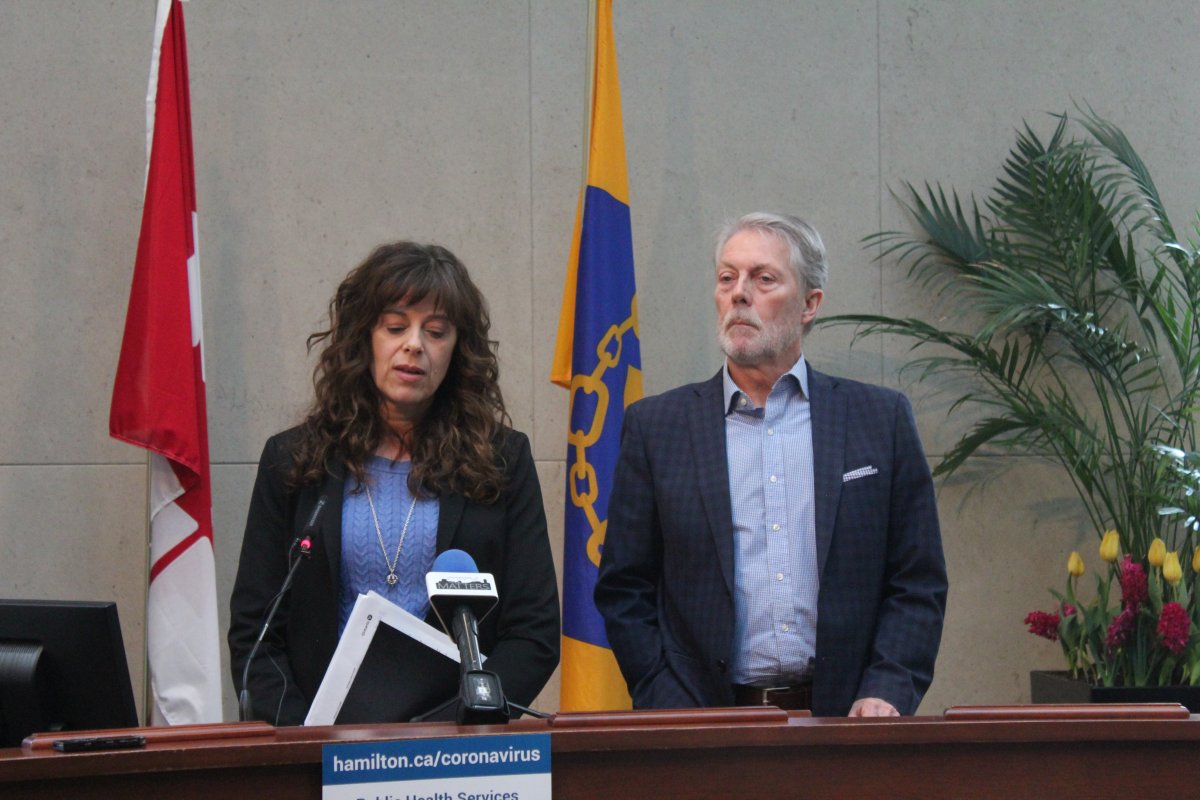Hamilton public health (HPH) reported 10 new cases of COVID-19 on Tuesday, bringing the city’s overall total of positive cases to 101.

In an update at city hall, medical officer of health Dr. Elizabeth Richardson said some of the additions were connected to a backlog of lab tests working their way back to the city from public health Ontario laboratory.
Richardson says 43 per cent of the 101 cases are connected to travel, with 24 believed to have come through community transmission.
Twenty-nine cases have been resolved which are cases with persons asymptomatic and no longer considered infected, according to public health.
However, Richardson said they believe there are more cases out there than the ones being tested. She estimates maybe “10 times to slightly more than that” in terms of actual cases in the community.
“That’s why for anybody who is sick, it is very important that if they have any symptoms whatsoever, that they stay home,” Richardson said.

The city’s medical officer of health also said the city would be returning to Heritage Green Nursing Home in Stoney Creek, Ont. to test 17 residents and 10 staff that were symptomatic for COVID-19.

Get weekly health news
“So we are in the process of making that change, and so at this point, we would say we’re going to step back,” said Richardson.
“We’re going to do that testing and see what the results are.”
Hamilton police have confirmed their first positive COVID-19 case, revealing a patrol officer contracted the affliction in March.
The service has released few details about the officer who they say had no contact with anyone in the community since March 12.
“The member did report to a shift on March 22 but was immediately sent home,”police spokesperson Jackie Penman told Global News. “The member has been self-isolating since then.”
Meanwhile, ArcelorMittal Dofasco are reporting two confirmed cases of COVID-19 connected to their operation.
The Hamilton steelmaker confirmed its first case in the pickling and cold roll portion of the business, the second a third-party contractor who was on-site in the materials handling and logistics business unit.
Dofasco says the employees have been quarantined from work and are at home self-isolating.
On Tuesday, Niagara public health said cases in that region rose by another 13 to a total of 47 confirmed positive tests. Seven cases have been resolved.
On Monday night, Niagara Health reported the region’s second death with a patient dying of the affliction on Sunday afternoon at St. Catharines hospital.

As of Tuesday, Halton Region is reporting 59 positive cases of COVID-19, with 24 residing in the Oakville area.
Brant County has 11 confirmed cases, and Norfolk and Haldimand counties are jointly reporting 27 positive cases with 2 deaths in the region as of March 30.
Haldimand-Norfolk Health Unit says eleven positive tests have come from residents at Anson Place, which is a retirement home and long-term care facility.
Questions about COVID-19? Here are some things you need to know:
Health officials caution against all international travel. Returning travellers are legally obligated to self-isolate for 14 days, beginning March 26, in case they develop symptoms and to prevent spreading the virus to others. Some provinces and territories have also implemented additional recommendations or enforcement measures to ensure those returning to the area self-isolate.
Symptoms can include fever, cough and difficulty breathing — very similar to a cold or flu. Some people can develop a more severe illness. People most at risk of this include older adults and people with severe chronic medical conditions like heart, lung or kidney disease. If you develop symptoms, contact public health authorities.
To prevent the virus from spreading, experts recommend frequent handwashing and coughing into your sleeve. They also recommend minimizing contact with others, staying home as much as possible and maintaining a distance of two metres from other people if you go out.
For full COVID-19 coverage from Global News, click here.
- After controversial directive, Quebec now says anglophones have right to English health services
- Something’s fishy: 1 in 5 seafood products are mislabelled, study finds
- Why non-alcoholic beer is gaining steam at Oktoberfest: ‘Nobody will judge you’
- Recall expands for Nutrabolics vegan bars over undeclared milk









Comments